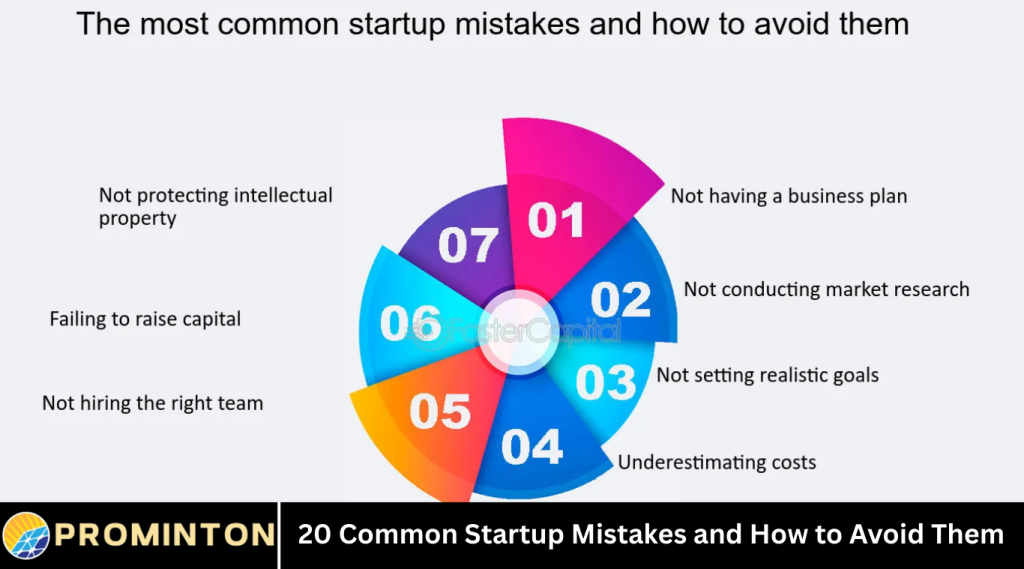Starting a new business is an exciting journey full of possibilities and challenges. Many entrepreneurs dream of building successful startups, but the path is often difficult and full of pitfalls. Making mistakes is part of the learning process, but some common errors can slow down or even stop a startup’s growth. Understanding these mistakes and knowing how to avoid them can save time, money, and energy. This article explores twenty common mistakes startups make and offers simple advice to help entrepreneurs avoid them. Whether you are just starting or already running a business, this guide will help you make smarter decisions for success.
Not Researching the Market Properly
Understanding your market is essential. Many startups fail because they do not study the market well enough before launching. This includes knowing who your customers are, what they need, and how much they are willing to pay.
To avoid this mistake, spend time researching your target audience and competitors. Conduct surveys, interviews, and market analysis to learn what people want and how you can offer something unique.
Ignoring Customer Feedback
Some startups focus too much on their own ideas and ignore what customers say. Customer feedback is valuable and can help improve products or services.
Make it a habit to listen carefully to customer opinions. Use surveys, reviews, and direct conversations to understand what works and what needs improvement.
Poor Financial Management
Managing money is one of the biggest challenges for startups. Overspending, not budgeting properly, or not tracking expenses can lead to financial trouble.
Create a detailed budget and monitor your finances regularly. Consider using simple accounting software or hiring a professional to keep your books in order.
Not Having a Clear Business Plan
Without a clear plan, startups may lose direction and focus. A business plan outlines your goals, target market, strategies, and financial projections.
Write a simple business plan that guides your decisions and helps communicate your vision to partners or investors.
Trying to Do Everything Alone
Entrepreneurs often try to handle every task themselves. This can lead to burnout and mistakes.
Build a team or seek help from mentors, advisors, or freelancers. Delegating tasks allows you to focus on your strengths and grow your business.
Choosing the Wrong Team Members
Your team plays a crucial role in your startup’s success. Hiring the wrong people or not having clear roles can cause problems.
Take time to hire individuals who share your vision, have the right skills, and work well together.
Not Understanding the Competition
Ignoring competitors can be dangerous. Knowing who else serves your customers helps you find your unique advantage.
Study your competitors’ strengths and weaknesses. Use this knowledge to offer better products, pricing, or customer service.
Overcomplicating the Product or Service
Sometimes startups add too many features or make their product too complex. This can confuse customers and increase costs.
Keep your product simple and focus on solving a specific problem well. You can add more features later based on customer needs.
Poor Marketing Strategy
Even the best product needs good marketing. Without a clear marketing plan, startups struggle to reach customers.
Develop a marketing strategy that fits your budget and audience. Use social media, content marketing, and networking to spread the word.
Neglecting Sales
Marketing attracts attention, but sales close deals. Some startups focus on marketing but neglect sales efforts.
Build a sales process that turns leads into customers. Train your team or yourself in effective sales techniques.
Ignoring Legal Requirements
Starting a business involves legal responsibilities like registering the company, getting licenses, and following regulations.
Make sure you understand and comply with all legal requirements. Consult a lawyer if needed to avoid costly issues later.
Failing to Adapt
Markets and customers change. Startups that stick rigidly to their original ideas risk becoming irrelevant.
Stay flexible and open to change. Use customer feedback and market trends to improve your product and strategy.
Setting Unrealistic Goals
Setting goals that are too ambitious or vague can lead to disappointment and poor performance.
Set clear, achievable goals and track your progress. Break large goals into smaller steps to stay motivated.
Poor Time Management
Running a startup demands managing many tasks. Poor time management can cause missed deadlines and stress.
Use tools like calendars, to-do lists, or project management software. Prioritize important tasks and avoid distractions.
Ignoring Cash Flow
Cash flow is the money coming in and out of your business. Even profitable startups can fail if they run out of cash.
Monitor your cash flow carefully and plan for expenses. Keep some savings for emergencies.
Not Building a Brand
A strong brand helps customers recognize and trust your business. Many startups neglect building their brand early on.
Create a clear brand identity with a logo, colors, and consistent messages. Build relationships with customers through good service.
Overdependence on One Customer or Supplier
Relying too much on a single customer or supplier can be risky. Losing that relationship could harm your business.
Diversify your customer base and suppliers to reduce risks.
Poor Customer Service
Good customer service builds loyalty and encourages repeat business. Neglecting customers can damage your reputation.
Train your team to respond quickly and politely to customer inquiries and complaints.
Not Using Data to Make Decisions
Data helps startups understand performance and customer behavior. Ignoring data means making decisions based on guesswork.
Collect and analyze data from sales, marketing, and customer feedback. Use this information to improve your business.
Giving Up Too Soon
Starting a business is hard and takes time. Many startups fail because founders give up too early when facing challenges.
Stay persistent, learn from mistakes, and keep improving. Success often comes after overcoming difficulties.
Frequently Asked Questions
What are the most common mistakes startups make?
Common mistakes include poor market research, ignoring customer feedback, bad financial management, lack of a clear plan, and trying to do everything alone.
How can startups avoid financial problems?
Startups should create detailed budgets, monitor expenses regularly, and seek professional advice if needed. Keeping track of cash flow is also essential.
Why is customer feedback important for startups?
Customer feedback helps improve products and services, ensuring they meet market needs. It also builds customer loyalty and trust.
How do I build a good startup team?
Hire people who share your vision, have the right skills, and complement each other. Clear roles and good communication are important.
How can startups manage time better?
Use planning tools, prioritize tasks, avoid distractions, and set realistic goals to manage time effectively.
What should startups focus on first: marketing or sales?
Both are important, but startups should develop marketing to attract customers and a sales process to convert leads into buyers.
How long does it take for a startup to succeed?
Success varies widely depending on the business and market. Patience, persistence, and continuous learning are key to long-term success.
Conclusion
Starting and running a successful startup is a challenging but rewarding journey. Many common mistakes can slow growth or cause failure, but knowing these errors and how to avoid them helps entrepreneurs make better decisions. From understanding the market to managing finances, building a team, and focusing on customers, every step matters.
By planning carefully, listening to customers, managing money wisely, and staying flexible, startups can increase their chances of success. Remember that mistakes are part of learning, but avoiding common pitfalls saves time and resources. Use this guide to navigate your startup journey with confidence and build a business that lasts.



